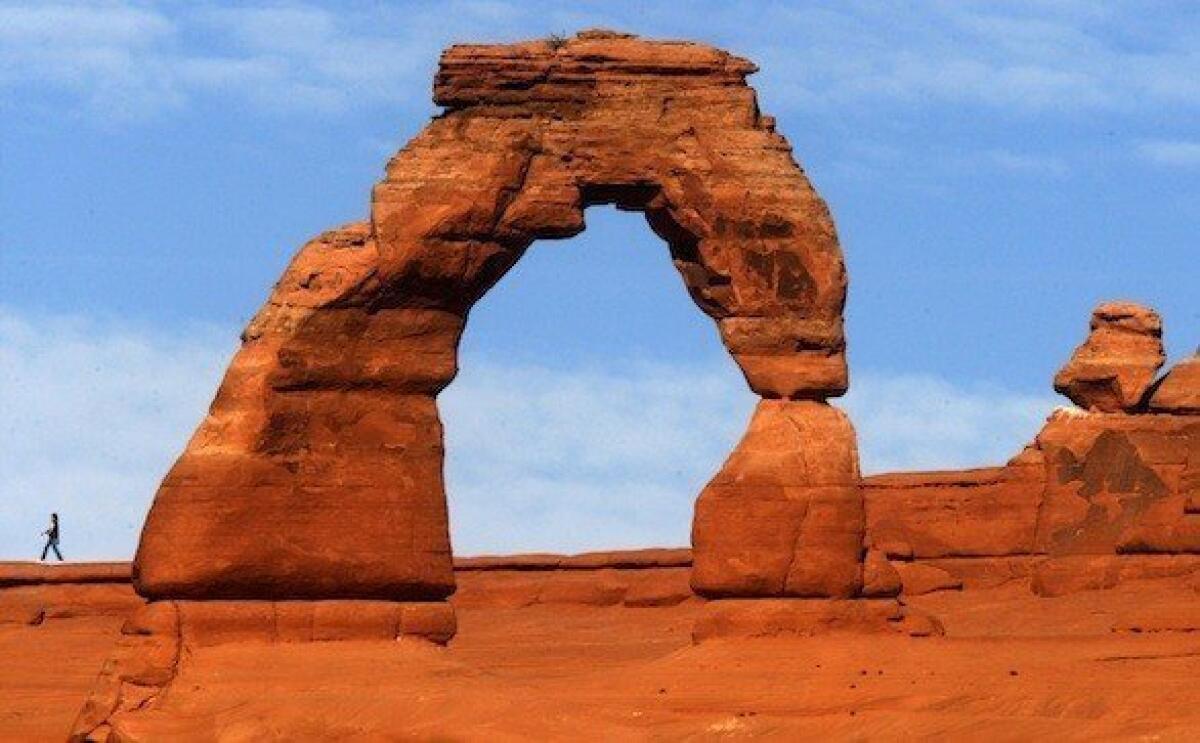Trump administration backs off plans to open land near Utah national parks to drilling

- Share via
WASHINGTON — The Trump administration has canceled plans to open tens of thousands of acres for oil and gas drilling near three national parks in Utah next month, a victory for environmentalists and residents angered by its proposal.
In all, the Bureau of Land Management’s plans had called for more than 114,000 acres of federal land across southern Utah to be auctioned off in September, one of many lease sales across the West planned for the end of this year. But from the outset, the proposal generated fierce debate because most of the land — about 87,000 acres — is close to three of the state’s biggest tourist attractions: Arches, Canyonlands and Capitol Reef national parks.
Critics said that, under the original proposal, visitors in search of iconic views would instead be treated to a landscape crisscrossed by power lines, access roads and pipelines. In letters to the agency, local elected officials, tribal governments, environmentalists and those in the tourism business also worried about increasing air pollution and heavy truck traffic, as well as the long-term effects that more oil and gas development would have on a warming planet.
“All of these concerns run counter to the thriving outdoor community and high quality of life that has attracted many tourists and our residents,” Emily Niehaus, the mayor of Moab, Utah, wrote to the agency.
Elected officials in Grand County and Moab, the county seat, voted to oppose the lease sale. Local opposition caught the attention of state officials, who asked the bureau to reconsider its plans.
Environmental Protection Agency officials submitted a letter warning that the bureau’s environmental assessment of the lease sales pointed to the possibility of worsening air quality, less visibility and “increased risk of cancer.”
Bureau of Land Management officials on Tuesday said that, while most of the contested land would now be off-limits, they still plan to move forward with leasing more than 27,000 acres in other parts of the state.
“Understanding the nature of the proposed parcels, as well as gathering input from local communities, partners and the public are a priority for me,” said Greg Sheehan, the agency’s Utah state director. “The BLM supports the recreation and tourism industry as an important source of revenue in Utah, while also responsibly leasing and supporting our nation’s energy independence.”
Steve Bloch, legal director for the Southern Utah Wilderness Alliance, praised the bureau’s reversal.
“This particular sale highlights why the odious practice of oil and gas leasing on public lands needs to come to a halt,” he said in an emailed statement. “The proposed leases in southeast Utah were located on some of Utah’s wildest public lands, lands with at best a trivial amount of oil and gas but where development would scar the land for decades if not permanently.”
“This enormous oil and gas drilling plan was a mistake from the very beginning and we’re relieved it has finally been deferred,” said Erika Pollard, associate southwest director at the National Parks Conservation Assn. “This victory will ensure, for now, the spectacular views at Arches and Canyonlands remain unspoiled by industrialization.”
Environmental groups remain concerned that the land could be opened for fossil fuel development in the future. Though the agency responded to pressure to remove the leases from the September sale, it could put them back up for auction at the end of the year.
The agency’s decision to defer the sale marks the second time a Republican administration has attempted to open vast areas of land in Utah’s red rock country to oil and gas development — and failed. In 2008, the Bush administration tried to lease tracts in the same region, but lawsuits brought by environmental groups blocked the sale.
The Trump administration’s “energy dominance” agenda has run into similar difficulties. Courts have ordered the government to suspend or void hundreds of leases, finding that the agency made procedural mistakes and violated environmental laws in its haste to increase domestic oil and gas production.
More to Read
Get the L.A. Times Politics newsletter
Deeply reported insights into legislation, politics and policy from Sacramento, Washington and beyond. In your inbox twice per week.
You may occasionally receive promotional content from the Los Angeles Times.











